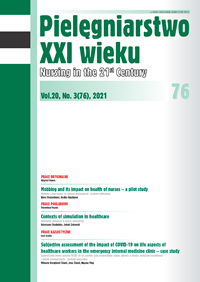Subjective assessment of the impact of COVID-19 on life aspects of healthcare workers in the emergency internal medicine clinic – case study
DOI:
https://doi.org/10.2478/pielxxiw-2021-0027Keywords:
pandemics, life, fear, workplace, emergency medicineAbstract
SUBJECTIVE ASSESSMENT OF THE IMPACT OF COVID-19 ON LIFE ASPECTS OF HEALTHCARE WORKERS IN THE EMERGENCY INTERNAL MEDICINE CLINIC – CASE STUDY
Aim. An aim was to study the impacts of COVID-19 on the lives of healthcare workers involved in treatment, care and diagnosis of positive patients.
Material and methods. The research was based on a qualitative research approach – a case study. Semi-structured interviews were performed with three healthcare workers from the emergency internal medicine clinic.
Results. The data obtained from the research can be summarized in 3 categories: the impact of COVID-19 on professional and private life and the impact of COVID-19 on personality and internal changes. Within the categories, another 14 subcategories were structured. The COVID-19 pandemic negatively affects all aspects of the lives of healthcare workers and generates negative emotions. The most commonly expressed emotion is fear; where fear for others, for existence and the future prevails. The epidemic also refl ected on the inability to meet the basic human needs of the respondents.
Conclusions. To reduce the negative impact of pandemic on work, additional research is needed to assess its influence on employees. The research suggests the inclusion of psychological support as well as more extensive education for employees to reduce the possibility of burnout in the workplace, anxiety, depression and worries about existence.
References
1. Chen N, Zhou M, Dong X, et al. Epidemiological and clinical characteristics of 99 cases of 2019 novel coronavirus pneumonia in Wuhan, China: a descriptive study. Lancet. 2020; 395: 507–513.
2. Wang D, Hu B, Hu C, et al. Clinical Characteristics of 138 Hospitalized Patients With 2019 Novel Coronavirus–Infected Pneumonia in Wuhan, China JAMA. 2020; 323: 1061–1069.
3. Sohrabi C, Alsafi Z, O’Neill N, et al. World Health Organization declares global emergency: A review of the 2019 novel coronavirus (COVID-19). Int. J. Surg. 2020; 76: 71–76.
4. WHO. Middle East respiratory syndrome coronavirus (MERS-CoV). World Health Organization; 2019. Available from: https://www.who.int/emergencies/mers-cov/en/. Accessed: May 06, 2020.
5. WHO. Clinical management of severe acute respiratory infection when novel coronavirus (2019-nCoV) infection is suspected: interim guidance, World Health Organization; 2020. Available from: https://apps.who.int/iris/bitstream/handle/10665/330893/WHO-nCoV-Clinical-2020.3-eng.pdf?sequence=1&isAllowed=y. Accessed May 07, 2020.
6. Phelan A, Katz R, Gostin LO. The Novel Coronavirus Originating in Wuhan, China: Challenges for Global Health Governance. JAMA. 2020; 323: 709-710.
7. HZJZ. COVID-19 Priopćenje prvog slučaja. Hrvatski zavod za javno zdravstvo, 2020. Available from: https://www.hzjz.hr/priopcenja-mediji/covid-19-priopcenje-prvog-slucaja. Accessed: May 07, 2020.
8. Chen Q, Liang M, Li Y, et al. Mental health care for medical staff in China during the COVID-19 outbreak. Lancet Psychiatry. 2020; 7: 15-16.
9. BBC. Coronavirus: Remembering 100 NHS and healthcare workers who have died. British Broadcasting Company, 2020. Available from: https://www.bbc.com/news/health-52242856. Accessed: May 01, 2020.
10. Kang L, Li Y, Hu S, et al. The mental health of medical workers in Wuhan, China dealing with the 2019 novel coronavirus. Lancet Psychiatry. 2020; 7: 14.
11. Wu P, Fang Y, Guan Z, et al. The psychological impact of the SARS epidemic on hospital employees in China: exposure, risk perception, and altruistic acceptance of risk. Can J Psychiatry. 2009; 54: 302-11.
12. Neto MLR, Almeida HG, Esmeraldo JD, et al. When health professionals look death in the eye: the mental health of professionals who deal daily with the 2019 coronavirus outbreak. Psychiatry Res. 2020; 288: 112972.
13. Perry C, Jensen O. Approaches to Combining Induction and Deduction In One Research Study. 2011. Available from: https://www.researchgate.net/publication/255654388_Approaches_to_Combining_Induction_and_Deduction_In_One_Research_Study. Accessed: February 16, 2020.
14. Tong A, Sainsbury P, Craig J. Consolidated criteria for reporting qualitative research (COREQ): a 32-item checklist for interviews and focus groups. Int J Qual Health Care. 2007; 19: 349-357.
15. Sun N, Wei L, Shi S, et al. A qualitative study on the psychological experience of caregivers of COVID-19 patients. Am. J. Infect. Control. 2020; 48: 592-598.
16. Lu W, Wang H, Lin Y, et al. Psychological status of medical workforce during the COVID-19 pandemic: A cross-sectional study. Psychiatry Res. 2020; 288: 112936.
17. Kim Y. Nurses’ experiences of care for patients with Middle East respiratory syndrome-coronavirus in South Korea. Am. J. Infect. Control. 2018; 46: 781–787.
18. Jiang F, Deng L, Zhang L, et al. Review of the Clinical Characteristics of Coronavirus Disease 2019 (COVID-19). J. Gen. Intern. Med. 2020; 35: 1545-1549.
Downloads
Published
Issue
Section
License
Copyright (c) 2021 Authors

This work is licensed under a Creative Commons Attribution-NonCommercial-NoDerivatives 4.0 International License.




